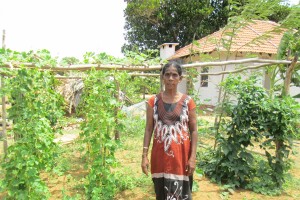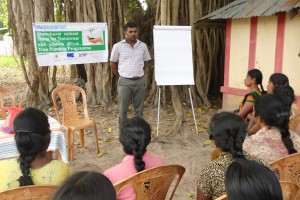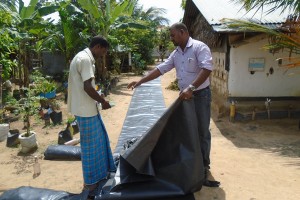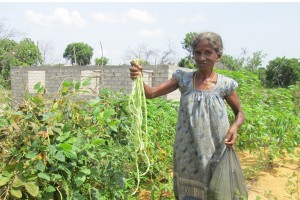Introducing Organic Home Gardening to families in Sri Lanka’s Northern Province
January 2016, Northern Province, Sri Lanka: UN-Habitat is supporting healthy and sustainable livelihoods for conflict affected  returnee families in Sri Lanka’s Northern Province by promoting grass roots agricultural interventions.
returnee families in Sri Lanka’s Northern Province by promoting grass roots agricultural interventions.
In early 2015, with the aim of improving household nutrition and to increase the availability of fresh fruit and vegetables in conflict affected villages, the Organic Home Gardening (OHG) Project was introduced by UN-Habitat. Within a relatively short period, the project has supported 270 returnee families to establish organic home gardens in 52 villages in Kilinochchi and Mullaitivu districts. This initiative has been supported through the post-conflict housing and infrastructure construction programmes funded by the European Union and the Governments of Japan, Australia, Switzerland and India. Over 1,000 people have already benefitted from  improved nutrition due to the increased availability of local fruits and vegetables in their localities. The families participating in organic home gardening have successfully used available cultivable land whilst ensuring environmental sustainability. This programme has been implemented by UN-Habitat in close collaboration with the Department of Agriculture and community members.
improved nutrition due to the increased availability of local fruits and vegetables in their localities. The families participating in organic home gardening have successfully used available cultivable land whilst ensuring environmental sustainability. This programme has been implemented by UN-Habitat in close collaboration with the Department of Agriculture and community members.
In close consultation with the communities and with the assistance of the Agriculture Extension Officers, UN-Habitat selected 70 beneficiaries from Kilinochchi and 200 beneficiaries from Mullaitivu to participate in the OHG programme. From this group, 15 beneficiaries were selected as “farmer leaders”. When selecting beneficiaries, priority was given to the most vulnerable families, particularly female-headed households.
The selected beneficiaries were trained by the Department of Agriculture on key aspects of Organic Home Gardening including land  preparation, pest and disease control, composting and nursery preparation, seed propagation and harvesting. A variety of plants and seeds have been distributed to the beneficiaries including okra, bitter gourd, snake gourd, chili, capsicum, radish, spinach, eggplant, beans, long beans, tomato, green gram and leafy vegetables. The beneficiaries were also provided thick polythene sheets to be used to produce compost.
preparation, pest and disease control, composting and nursery preparation, seed propagation and harvesting. A variety of plants and seeds have been distributed to the beneficiaries including okra, bitter gourd, snake gourd, chili, capsicum, radish, spinach, eggplant, beans, long beans, tomato, green gram and leafy vegetables. The beneficiaries were also provided thick polythene sheets to be used to produce compost.
UN-Habitat closely coordinated and monitored the project while the farmer leaders have played a key role in community mobilisation and coordination of the OHG programme in the villages.
At the inception of the project, the implementing partners faced several challenges as some of the families were reluctant to venture into organic home gardening, mainly due to their lack of awareness. However, these concerns were addressed through focused training.
 Since the inception of the programme, fast growing crops such as spinach, tomatoes and beans have been harvested in 30 to 65 days. OHG has also generated a supplementary income for families when gardens were modified to local agronomic and resource conditions. Mrs. K. G. Lalitha, a beneficiary from Nikkewewa, Welioya in Mullaitivu District stated “I am happy that our family was selected for this project. We got the opportunity to learn about growing organic vegetables. In addition, we are able to sell some of the extra vegetables to earn an additional income for our family”
Since the inception of the programme, fast growing crops such as spinach, tomatoes and beans have been harvested in 30 to 65 days. OHG has also generated a supplementary income for families when gardens were modified to local agronomic and resource conditions. Mrs. K. G. Lalitha, a beneficiary from Nikkewewa, Welioya in Mullaitivu District stated “I am happy that our family was selected for this project. We got the opportunity to learn about growing organic vegetables. In addition, we are able to sell some of the extra vegetables to earn an additional income for our family”
OHG can be practiced by families with small plots of land, as it is low in cost and relies on low risk technology that can be adapted to hostile environments. Although the combined value of garden production varies seasonally, it constitutes a significant proportion of the total household income, over 20 percent for many households. The collective value of garden production includes surplus vegetable produce and animal products, together with savings in food and medical expenses. Moreover, the organic home garden may become the primary source of household food and income during periods of stress, such as harvest failure, pre-harvest lean season and periods of prolonged unemployment.
Mrs. Supaiya Sritharan from Uttupulam stated “We do not have to worry about chemicals affecting our health as we now have an organic home garden”. Family members, including children are actively participating in the OHG project. Some beneficiaries exchange vegetables from their organic home gardens to add variety to their meals. Discussing the success of her organic home garden, Mrs. Pakkiyam from Kokkuthoduwai North, Maritimepattu in Mullaitivu, said, “My children help me in the garden. They have enough food to eat now, and a wide variety of choices”.
The organic home gardening project has supported 270 families to date. UN-Habitat is hoping to expand the project to additional families and several preschools in the Northern Province.
